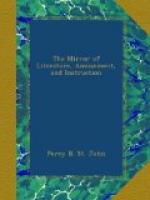[2] For an Engraving and full description of the Mosque
of Santa Sophia,
see the mirror, vol.
ii. p.p. 473, 486.
[3] Mr. Hobhouse has pointed out some remarkable points
of similarity
between the funereal customs
of the Greeks and those of the Irish; in
particular, the howling lament,
the interrogating the corpse, “Why did
you die?” and the wake
and feast. “But a more singular resemblance,”
he adds, “is that which
is to be remarked between a Mahommedan and an
Irish opinion relative to
the same ceremony. When a dead Mussulman is
carried on his plank towards
the cemetery, the devout Turk runs from
his house as the procession
passes his door, for a short distance
relieves one of the bearers
of the body, and then gives up his place
to another, who hastens to
perform the same charitable and holy office.
No one who has been in Ireland,
but must have seen the peasants leave
their cottages or their work,
to give a temporary assistance to those
employed in bearing the dead
to the grave an exertion by which they
approach so many steps nearer
to Paradise.”
[4] “Sultan Mahmoud’s horse was actually
interred in the cemetery of
Scutari, under a dome supported
by eight pillars.”
* * * * *
TWO SONNETS.
To M—— F——.
(For the Mirror.)
I.
I met thee, ——, when
the leaves were green,
And living verdure clothed
the countless trees;
When meadow flowers allured
the summer bees,
And silvery skies shone o’er the
cloudless scene,
Bright as my thoughts when wand’ring
to thy home;
Where Nature looks as though
she were divine,
Not in the richness of the
rip’ning vine,
Not in the splendour of imperial Rome.
It is a ruder scene of rocks and trees,
Where even barrenness is beauty—where
The glassy lake, below the
mountain bare,
Curls up its waters ’neath the casual
breeze;
And, ’midst the plenitude of flower
and bud,
Sweet violets hide them in the hilly wood.
II.
I parted with thee one autumnal day,
When o’er the woods
the northern tempest beat—
The spoils of autumn rustling
at our feet,
And Nature wept to see her own decay.
The pliant poplar bent beneath the blast;
The moveless oak stood warring
with the storm,
Which bow’d the pensive
willow’s weaker form;
And naught gave token that thy love would
last,
Save the mute eloquence of forcing tears;
Save the low pleading of thy
ardent sighs,
The fervent gazing of thy
glowing eyes;
A firm assurance, spite of all my fears,
That, as the sunshine dries the summer
rain,
Thy future smile should bless for
parting pain.




